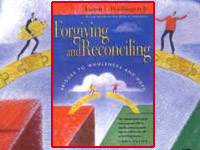Forgiving and Reconciling: Bridges to Wholeness and Hope (Everett L. Worthington, Jr., 2003)

“We talk a good forgiving line as long as somebody else needs to do it,” Christian ethicist Lewis Smedes noted, “but few of us have the heart for it while we are dangling from one end of a bond broken by somebody else’s cruelty.” Yet we know that forgiveness is not just what we have received as children of God but what we have been called to give—as graciously and freely as we have received it. “Forgive us our debts,” our Lord taught us to pray, “as we forgive our debtors” (Luke 11:4).
In his new book, Forgiving and Reconciling, which we recommend to you, Dr. Everett Worthington uses years of research and experience as a counseling psychology in the light of Scripture to unpack the meaning and process of forgiveness. The book is rich, warm, practical, convicting, and hopeful, and two of Worthington’s sidebars—reproduced here—challenge us to reflect more deeply on what God’s word has to say to us on this crucial topic.
Seven characteristics of biblical forgiveness
As Christians, when we forgive, we…
1. forbear, limiting our initial reaction through a developed forgiving personality, practice forgiving, suppression of negative motives
2. freely grant decisional forgiveness as soon as we can, implying our intention not to seek revenge or avoid, but to seek conciliation to the extent possible and to desire good for the person who harmed us
3. find other biblical ways to avoid or reduce unforgiveness such as seeking justice, accepting the wrong and moving on, turning judgment over to God, telling a different story about the event (see Gen 50:20)
4. focus on the good of the other person more than we focus on ourselves and the damage we have felt
5. feel agape love, empathy, sympathy, compassion for the person who harmed us
6. forgive because we have been forgiven rather than because we receive a blessing when we forgive
7. follow through on our changed emotions and motivations to not act negatively toward the person but to bless the person
What to do when you feel attacked
1. Don’t react. Instead of letting your own feelings rule, think.
2. Question why this might have happened.
3. Could the person’s fear, stress, worry or hurt have provoked the attack?
4. Is the person caught up in the punch and counterpunch of the situation?
5. Is the person feeling that you are somehow threatening his or her survival?
6. Is the person reacting more to his or her own painful past than to you?
7. If you have already lashed back, can you do anything to lessen the tension?
8. Can you apologize quickly before things get out of hand?
9. At a minimum, even if you believe the attack was not provoked, can you say, “I am not trying to make you angry—I don’t want us to argue”?
10. Before you respond with your own side of the argument, can you listen thoroughly to the person and summarize his or her point of view?
Questions
1. Describe some heros of forgiveness. What most impresses you about them?2. Identify a list of Scriptures that address forgiveness. Which texts might it be wise to study and meditate on? How do the following texts apply?: Exodus 34:6-7; Matthew 6:12-15; 9:1-8; 18:21-35; Luke 17:3-4; 23:34; Romans 12:9-21; Colossians 3:12-17; 1 Peter 3:8-9; 1 John 1:8-10.
3. Describe a time when you were forgiven. How did it make you feel? What did it do to your relationship with the one who hurt you? Your relationship with God?
4. Why is forgiving so difficult? When is it (relatively) easy? Why? Who are the people you find most difficult to forgive? Why?
5 .What is the role of Christian community in forgiveness? Is it possible to help one another grow in becoming more forgiving persons? What plans should you make?
6. How do you tend to react when you feel attacked? What do you find most difficult in responding Christianly to an attack? What is harder, to be attacked by a non-Christian or by a Christian? Why?
7. After feeling attacked, do you tend to relive the experience in your imagination, perhaps arguing with or correcting your attacker? How helpful does this tend to be in forgiving and seeking reconciliation?

